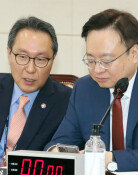Rise and fall of Korean banks in Tokyo
Rise and fall of Korean banks in Tokyo
Posted February. 27, 2014 08:55,
Appointment to a post at the Tokyo branch has long been considered path for promotion and success in the Korean financial community. Japan is an advanced country where all information across the world converges, and such a post used to be highly sought after by talented bankers from the initial selection phase, with competition highly intensive. Officials in Tokyo seconded by government ministries and conglomerates often used to take important posts after their return to Korea, and bank employees deployment in the Japanese capital helped them build up personal network, which is considered important assets at banks.
Up until the early 2000s, most of bank branch heads in Tokyo were promoted to executives after the termination of their term. Cho Joon-hee, former president of Industrial Bank of Korea (IBK) who was the first to be named the post is an expert on Japan who served as chief of its Tokyo branch. The same holds true with Lee Baek-soon, former president of Shinhan Bank; Choi Young-hwan, former vice president of Export-Import Bank of Korea; Cha Soon-gwan, president of KB Savings Bank; Baek Guk-jong, president of Woori Bank P&S; and Lee Shin-gi, vice president of Shinhan Financial Group. Lee Pal-seong, former chairman of Woori Financial Group, served as bank branch head in Seoul, but once worked at Tokyo branch.
Irregularities surrounding banks Tokyo branches have erupted in succession recently. Former head and vice head of Kookmin Banks Tokyo branch were arrested by prosecutors on the charge of pocketing rebate after making illegal loans worth 400 billion won (375 million dollars) to business partners. The Financial Supervisory Service launched audit after discovery of circumstantial evidence suggesting that illegal loans worth tens of millions of dollars had been extended by Tokyo branches of Woori Bank and IBK. The wrongdoings seem to be related with the situation where Tokyo branches of Korean banks could abuse their power amid rising demand for funds from so-called new comers who come to Japan and open businesses for self-employment to take advantage of the "Korean wave" bandwagon.
Since the mid- to late-2000s, Japans stature has been waning at many of Korean banks due to the deterioration of the Japanese economy and speedy inflow of information via the Internet. As more bank employees retire after serving as head of Tokyo branches, some critics say that competence and moral standards among bank employees stationed in Tokyo are not as high as their predecessors. Many bankers prefer English-speaking countries such as the U.S. and the U.K. to help their children learn English, and avoid working in Japan. It would be difficult for Tokyo branches to regain their glory of the past in the banking sector, but banks should prevent the Tokyo branches from falling into the status of second grade branch where they believe any employee can be dispatched to. Japan remains the worlds third largest economy, and is a country that wields sizable influence on Korea.
Editorial writer Kwon Soon-hwal (shkwon@donga.com)







